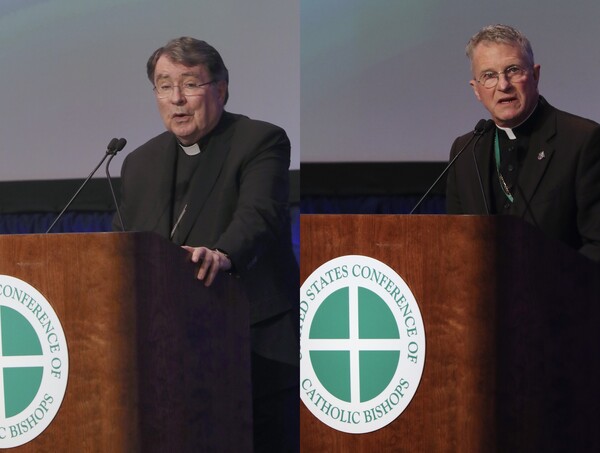
BALTIMORE — In separate addresses to the American bishops, Cardinal Christophe Pierre and Archbishop Timothy Broglio spoke on two major Church events of the past year — the Synod of Bishops on Synodality and the National Eucharistic Revival — and the need to keep each alive.
Both also talked about the 2024 election, but not specifically about President-elect Donald Trump.
Cardinal Pierre, the apostolic nuncio to the United States, connected the synod and Eucharistic revival, as well as the upcoming Jubilee of 2025, to Pope Francis’ recent encyclical, Dilexit nos (He Loved Us) on the Sacred of Jesus, in which the Holy Father underlines the social dimension of Christ’s love and caring for others as an extension of a personal, intimate relationship with God.
“Eucharistic revival, a more synodal form of evangelization, a jubilee year of hope — all of these experiences will produce fruit, provided that we return to the heart of Christ, that sacred place where human longing and divine love are united,” Cardinal Pierre told the bishops.
Cardinal Pierre’s address was one of the early items on the agenda for the first public session of the United States Conference of Catholic Bishops 2024 fall general assembly in Baltimore.
He reminded the bishops that the Eucharistic revival can only occur if the Eucharist is lived out in multiple dimensions, “not only gathering to adore but also by going out on mission so that Christ can encounter others.”
“Along these lines, on the Sacred Heart reminds us that there are two essential aspects that contemporary devotion needs to combine — first, personal spiritual experience; second, communal missionary commitment,” Cardinal Pierre explained.
On the synod, Cardinal Pierre noted it’s always been about inviting more participation in the Church’s missionary discernment. Therefore, he said, its success isn’t based on which decisions have been made or whose vision for the Church prevailed, but instead on the number of people who participate at various levels of the Church, the amount of shared discernment, and how listening is prioritized.
Cardinal Pierre said that opening their hearts to Christ will, in turn, allow them to better open their hearts to others.
“And so, for those who feel disappointed about the Church’s synodal process to this point — either for what it has been or for what it hasn’t been — I would share the encouragement that I think Pope Francis is offering us through this encyclical,” he said. “Essentially, the pope is saying to us: Look deeper for what synodality is about. Look to heart: your own heart, the heart of Christ, and the heart of the other person. From there, we can embark on a shared mission as a Church.”
Cardinal Pierre spoke last about the Jubilee, highlighting it’s something needed in the world and the United States given the fragmentation that exists in society, especially during election season. He said Pope Francis’ encyclical is a reminder that the heart is capable of “uniting the fragments.”
“By returning to the heart, we can address the ways in which we ourselves have become, if not incapable, then at least ‘handicapped,’ in our way of relating to certain others due to fragmentation,” Cardinal Pierre said.
Archbishop Broglio, president of the USCCB and archbishop of the Archdiocese for the Military Services, USA, gave his address immediately after Cardinal Pierre. He called last summer’s National Eucharistic Congress in Indianapolis a “high point” of the Eucharistic revival that now moves into a mission phase.
“We continue the mission to proclaim our faith in the Eucharist, to help the faithful discover or deepen its meaning, and to prolong the positive effects of the first two years of the Eucharistic revival,” he said.
On the synod, Archbishop Broglio noted the American Church is already very synodal in many of its existing structures, such as parish councils, parish and diocesan finance councils, and presbyteral councils. However, he said there is still work to be done.
“It is not easy to listen and to set aside the campaign positions that sometimes colored the approaches of certain participants,” Archbishop Broglio said of the synodal structures in the United States. “There is still an occasional sentiment that if I do not get what I want, the Church is not being synodal.
“We have to grow in our understanding and in our ability to listen to the Holy Spirit.”
